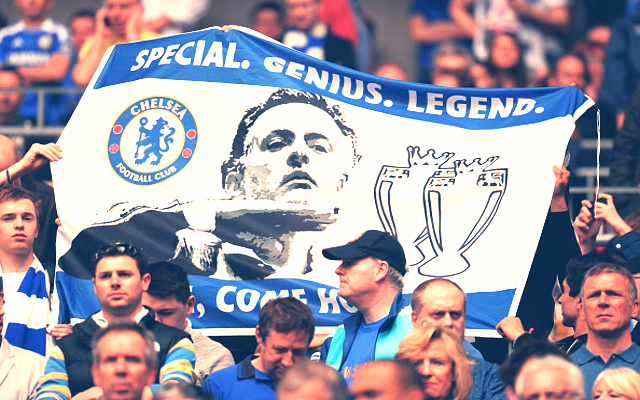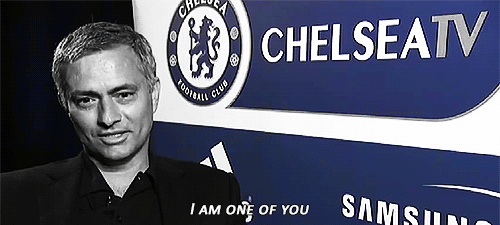The return is sweet, but Chelsea’s identity must transcend Mourinho
The return is sweet, but Chelsea’s identity must transcend Mourinho

The return is sweet, but Chelsea’s identity must transcend Mourinho
By Isi Lewis
Can’t live with him and can’t live without him, Jose Mourinho is the loveable rogue who gave Chelsea fans some of the greatest nights of their lives and then left them in a heap with a hangover; the ex they tried to get over. And now he’s coming back.
The prospect of Mourinho’s return to West London is sure to excite Chelsea fans. The self-proclaimed Special One that ended up actually being special, his title-winning achievements in 2005 and 2006 made history and helped put the club on the map; establishing Chelsea as a serious and genuine force in European football, at a time when many saw them as merely a plaything for Roman Abramovich.
So special, is Jose Mourinho, that no manager has ever succeeded in following him – his immediate successors at Porto, Chelsea and Inter all failed – but now we’re going to see how the Special One gets on following himself.
But for all the fervour and enthusiasm surrounding his return, taking Mourinho back suggests a wider problem for Chelsea: that the club have struggled to forge a strong enough identity without him.
Whilst last season’s Champions League heroics and a respectable finish in this season’s Premier League are hardly the marks of a club in turmoil, there is a sense that any success on the field still comes in the shadow of Mourinho.
Mourinho’s greatest success was not so much the titles, but the fact he helped shift the perception from Chelsea as a team of rich-kid prima donnas, to a powerful and ruthless team of winners. It’s a problem Manchester City faced for a long time, and one that QPR know well now.
Prior to Mourinho, Chelsea had for a long time struggled with the dichotomy of identity: In the 1990s, they were the continental, cosmopolitan club of the capital – epitomised by Gianfranco Zola, Roberto Di Matteo, Gianluca Vialli, Ruud Gullit and co. – mixing it with the British bulldog spirit of Dennis Wise and, later, John Terry. Mourinho was part of this, of course, but through players like John Terry and Frank Lampard, and the players he brought in such as Didier Drogba, Ricardo Carvalho, Michael Essien and Petr Cech, who formed the spine of his sides, Mourinho created an image of strength and power.
Much has changed at Chelsea since then, but a lot has also changed for Mourinho since he first arrived too. In 2004, Mourinho was the great pretender; a symbol of youth, promise, modernity and, with that, more than just a hint of arrogance.
These days, in 2013, Mourinho is very well established. His public persona is well-known. When Mourinho arrived, there was something exciting about the man who rubbed everyone up the wrong way. Those that liked him adored him, and those that disliked him despised him yet couldn’t help but respect him. Nowadays, for some people at least, it just wears you down. Certainly, there is a suggestion that this happened at Real Madrid.
For all his strengths – his great charisma, his siege mentality approach, his brilliant man management and motivation – Mourinho is also an egotist: It’s his way or the highway. He respects fans but he does not respect the institution of the clubs he is employed by. He seems to have a problem with those in higher authority than him, not to mention those who are loved more than him: Just ask Iker Casillas.
In many ways, the problem with Jose Mourinho is that his personality is too big for most clubs.
So charismatic and so headstrong, Mourinho is too domineering for his own good. He’s too much of a celebrity. When he takes over, he becomes the image of the club; and that club becomes symbolised by him. It is something which may very well have been used against him when being considered for the Manchester United job..
Mourinho’s management style is combative. His relationship with the media in every country he has ever worked in has been deliberately volatile. In the beginning, he was seen as something of a revolutionary, but his footballing principles are today considered by many as negative and outdated. His visions are typically short-term; he has little interest in building and developing players from youth teams or building towards the future.
With this backdrop, it is hard to see how his appointment fits in with some of the new signings and the apparent new approach at Chelsea, epitomised by a new breed of players – bought with youth and a modern, technical style in mind – the likes of Juan Mata, Eden Hazard, Oscar and David Luiz. The weeding out of the old guard: John Terry and Frank Lampard.
For all the criticism and unpopularity surrounding Rafael Benitez’s appointment, the Spaniard deserves credit for working with and towards this new era at Chelsea, a key factor of which involved dissolving and reducing the influence of Terry and Lampard to mark a vision of the future.
Questions remain as to what Mourinho will do with these older players, who once formed the lynchpin of his side. But he will more than likely succeed in turning this group of players into an army in his mould, trained to carry out orders around the counter-attacking style that has become synonymous with the man: To hustle the opposition and play fast on the break.
For now, Mourinho looks to be a very impressive appointment. He is a proven winner with a pedigree to all but guarantee trophies. But looking further down the road, Chelsea might need to think about what they are trying to achieve away from Mourinho, the love-you-and-leave-you man.
This post was written by Isi Lewis a freelance writer with regular features in When Saturday Comes. Comments below please.









